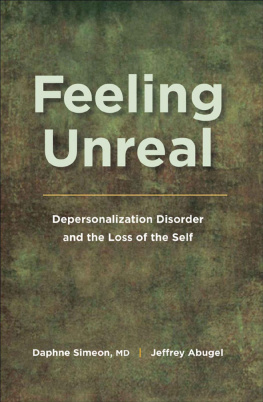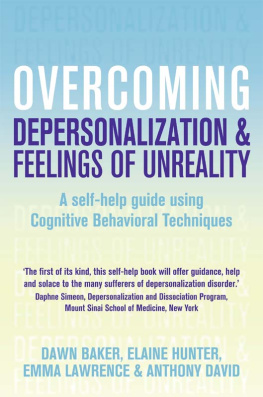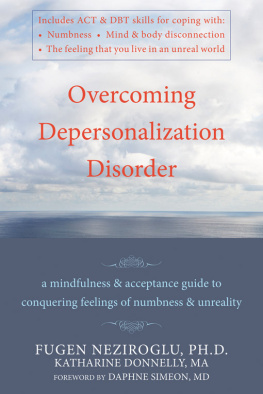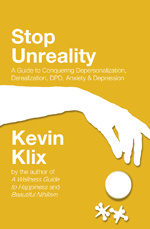Feeling Unreal

Self-portrait by 22-year-old woman suffering from depersonalization disorder
Feeling Unreal
Depersonalization Disorder and the Loss of the Self
Daphne Simeon, MD
Jeffrey Abugel


Oxford University Press, Inc., publishes works that further Oxford Universitys objective of excellence in research, scholarship, and education.
Oxford New York
Auckland Cape Town Dar es Salaam Hong Kong Karachi Kuala Lumpur Madrid Melbourne Mexico City Nairobi New Delhi Shanghai Taipei Toronto
With offices in
Argentina Austria Brazil Chile Czech Republic France Greece Guatemala Hungary Italy Japan Poland Portugal Singapore South Korea Switzerland Thailand Turkey Ukraine Vietnam
Copyright 2006 by Oxford University Press, Inc.
Published by Oxford University Press, Inc.
198 Madison Avenue, New York, New York 10016
www.oup.com
First issued as an Oxford University Press paperback, 2009
Oxford is a registered trademark of Oxford University Press
All rights reserved. No part of this publication may be reproduced, stored in a retrieval system, or transmitted, in any form or by any means, electronic, mechanical, photocopying, recording, or otherwise, without the prior permission of Oxford University Press.
Library of Congress Cataloging-in-Publication Data
Simeon, Daphne, 1958
Feeling unreal : depersonalization disorder and the loss of the self / Daphne Simeon, Jeffrey Abugel.
p. cm.
ISBN 978-0-19-538521-2
1. Depersonalization. 2. Identity (Psychology) I. Abugel, Jeffrey. II. Title.
RC553.D4S56 2006
155.2dc22 2005020558
9 8 7 6 5 4 3 2
Printed in the United States of America on acid-free paper
To our parents
Acknowledgments
Many minds have contributed to the enormous amount of information we have synthesized within these pages. Some of them are well known; others have languished in obscurity for decades, waiting for their observations to be rediscovered. We wish to thank the many thinkers through the years who each have contributed in their own way toward solving the puzzle of depersonalization, a most enigmatic human experience. We have tried to include as many of them as possible within the text. In addition, permit us to add these personal asides:
Jeffrey Abugel: I would like to note the support and encouragement of the late Oscar Janiger, M.D. Oz, as he was known, was a passionate explorer into the depths of the mind, and a strong motivating force during the embryonic stages of this book. As a doctor, friend, and teacher, he was living proof that curiosity and hunger for knowledge need not preclude a passion for life itself.
Daphne Simeon: I am deeply appreciative to all the teachers and mentors who have inspired and supported me, and to the many patients from whom I have learned and by whom I have been so touched.
Contents
Feeling Unreal
Introduction
This is the story of a mental condition that affects millions of people worldwideyet few even know its name. Depersonalization has been well-documented in medical literature for more than 100 years, but this book, the first definitive work on the subject, is long overdue.
Everyone feels unreal from time to time. It may happen after a traumatic event, while in new or foreign surroundings, or in times of severe stress. As a defense mechanism, depersonalization serves a purposeto mentally distance an individual from horrific or overwhelming circumstances. But this mechanism can go awry and exhibit a darker side, which manifests itself as depersonalization disorder.
For depersonalized people, the world within, or the world around, may seem strange and unreal for prolonged periods of time. They feel detached from the sense of self they once took for granted and struggle, often for many years, in fruitless searches for answers that are hard to come by.
Depersonalization can be transient or chronic. It may appear alongside other psychiatric disorders or completely on its own. It has been noted as the third most prevalent psychiatric symptom, after depression and anxiety, yet the average mental health professional usually knows little about it.
Imagine thinking without feeling, devoid of emotional connection to past or present. Imagine a heightened awareness of the thoughts parading through your head, or always watching yourself a step removed, interrupted periodically by a single emotionthe real fear of losing your mind. Living this way, feeling hollow, without familiar emotions, wreaks havoc on individuals inner lives. Yet outwardly they may appear completely normal, even well adjusted. They know something is wrong, but they may not know what it is, so their lives often become facades of normalcy, masks to cover the unreality within. What is it? What causes it? What does it mean, and can it be cured? These are the questions examined herein.
This book is the culmination of more than a century of research and observation. It is the combined effort of a psychiatrist, recognized as the leading investigator of depersonalization in the United States, and a journalist who experienced the condition for more than a decade and explored its philosophical and literary implications for years to follow. The diversity of our backgrounds has assured a rich and balanced approach to the topic. Our intention is to present an accurate and unbiased distillation of the broad range of scientific material that has addressed depersonalization for the last century and earlier. We also examine the many philosophical and literary references to depersonalization-like states of mind. Sensations of unreality and the experience of no-self appear often in literature and religion, under different names and different guises.
Feeling Unreal is the result of countless hours spent seeking answers to questions that have eluded so many for so long. We offer it as a foundationa solid ground on which patients and those who treat them alike can move forward, with greater knowledge of this baffling condition, and in turn, greater understanding of our individual selves.
1 Strangers to Our Selves
The mind is its own place, Milton reminds us. And in itself can make a heaven of hell, and a hell of heaven. For most people, these lines from Paradise Lost are likely just the stuff of some long-forgotten English literature course. But for Ron, a 32-year-old magazine editor living in a coastal city, they ring true with profound insight. To his peers, Rons life is practically heaven on earth. Hes bright, funny, and successful at his job in publishing. With an apartment near the beach and plenty of friends, he is living a life that is envied by many. But Ron has a problem. And each day when he returns to his upscale neighborhood in time to see the sun setting, he wonders how long he can maintain what he has. He wonders if tonight will be the night he finally slips into the isolated hell of insanity.
Rons problem is a mental one, and he knows it. Trapped within the confines of his mind, he is too aware of every thought passing through it, as if he were outside, looking in. At night he often lies awake ruminating endlessly about whats wrong with him, about death, and about the meaning of existence itself. At times his arms and legs feel like they dont belong with his body. But most of the time, his mind feels like it is operating apart from the body that contains it.
Next page












